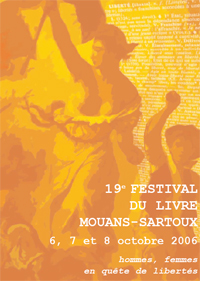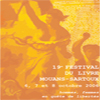The Mouans-Sartoux Book Festival will lead us in 2006 on the paths of freedom.
Freedoms. All kinds of freedoms.
The open questions, based on the first among them, the freedom of thought, will attempt to bring together men and women of the world, without barriers and without taboos.
The quest for freedoms is accompanied by the resistance to various forms of constraints, deprivations, oppressions, instilling the dynamics of life and the dignity of human beings.
 Nice-Première: Marie-Louise Gourdon, introduce us to the 2006 Mouans-Sartoux Book Festival.
Nice-Première: Marie-Louise Gourdon, introduce us to the 2006 Mouans-Sartoux Book Festival.
Marie-Louise Gourdon: It has existed for 19 years when we created it with my husband, Michel Gourdon. Today, the festival knows no borders after experiencing enormous regional growth in the early years. This weekend, we expect 50,000 visitors over the three days across 8,000 m² of space. For this, 370 authors over 200 exhibitions are ready to welcome them to continue on this long path on which we have been evolving for 19 years.
But it will still require a lot of patience, tenacity, and commitment to make this 2006 festival grandiose and to ensure that the following ones are too. Indeed, our goal is to first maintain and then to develop and amplify the festival and its effects on the public. A public that we want to lead toward everything related to reading, toward this meeting place that is the book.
Moreover, the reward for all the work provided is arriving little by little because we are one of the 3 or 4 most important national book fairs with our 50,000 visitors. Especially when you consider that there are 10,000 inhabitants in Mouans-Sartoux and 250 who allow this festival to be held.
NP: These volunteers, what role do they play in holding this event?
MLG: They are indispensable and do a remarkable job. They are motivated because they enjoy it, this allows the festival to take place. Without them, we wouldn’t experience this conviviality that makes this book festival strong. Moreover, the fact that they are not paid is an advantage because they come freely. They choose to come because they are interested in the event, thus offering great flexibility and enormous conviviality.
NP: The festival is not solely dedicated to books. Can you tell us more?
MLG: Indeed, there are also several debates and conferences with professionals and journalists planned during this weekend. Many issues are addressed leading to an important outpouring of ideas.
The richness of this festival also comes from the number of these professional-public relationships: 200 debates (some simultaneously), 100 interviews, conferences, and film screenings over three days.
This depth in the subjects covered allows what seems to me to be most important, namely to achieve a festival for everyone whether one loves youth, culture, or other equally present themes.
NP: Friday is generally the ‘youth day’ with the presence of children and a Prize for the “pitchouns” (little ones).
MLG: This prize has existed for 15 years. The books presented were made by the children last year and are magnificent. They are books ‘by the children for the children’.
On this topic we have three goals:
– We want, through this day and this prize, to lead the children toward the book, to encourage them to write, to invent what a book is. They take great pleasure in this and one can feel a desire to write, to create models.
– We also want them to realize that it is an object to be made more than just read. Bringing this change in relationship with books is crucial, and there is a clear desire since 8,000 children from kindergarten to high school will come from Monday to Friday.
– Finally, we believe it’s important that the children first meet the authors with their school and then return on Saturday or Sunday with their parents. However, it should not be flashy, we aim for the long term.
NP: Is there a prize for adults as well?
MLG: Of course. It is the ‘Prize for the Unpublished’, sponsored by Acte Sud and Le Monde. This year, the theme is journaling. Authors have from January to May 1 to write and are rewarded with an important first prize: a publication by Acte Sud, which is one of the largest houses on the coast. But to hope to win, one needs a great creative idea.
NP: The book festival takes place in Mouans-Sartoux. What effect does it have on the city throughout the year?
MLG: The festival has a colossal effect. We wanted to have a media library, which is a very difficult project to achieve in such a small town, but we succeeded. This is the fruit of the desire for books since 60% of Mouans-Sartoux’s population is registered. It’s a huge result in addition to the also created movie theaters.
There is a positive image in relation to the book, especially since many other events take place throughout the year.
NP: You manage to bring in big personalities. How does it work?
MLG: It’s simple. Some people have such a busy agenda that they decide to come several years in advance. There is enormous team work that encourages other authors to return because they notice the great trust and seriousness that has been established here. Then, we rely on the snowball effect of relationships.
NP: You mentioned an international aspect of the event. Is it important to you?
MLG: No, the festival does not have an international scope. Of course, we welcome among others Italian, Egyptian, Vietnamese, or Algerian authors, but that’s because they talk about writing and freedom.
If what they do interests us, we invite them. We go where they are.
The financial aspect comes into play so we cannot invite 20 authors, but we do the best we can. All while keeping freedom in our choices. It’s important…


